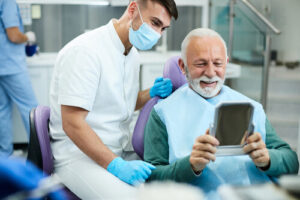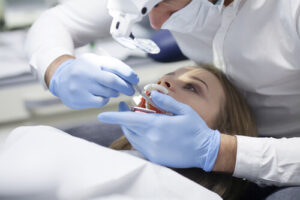Proper oral care is crucial for cancer patients undergoing treatment, as it plays a vital role in maintaining overall health and well-being. Cancer treatments such as chemotherapy and radiation therapy can have significant side effects that affect the mouth and oral tissues. These side effects include dry mouth, mouth sores, infections, and an increased risk of dental problems. Therefore, cancer patients must pay special attention to their oral hygiene routines and seek professional dental care to minimize discomfort, manage side effects, and promote oral health throughout their cancer journey. By implementing appropriate oral care for cancer patients can mitigate potential complications and maintain a healthy mouth, improving their quality of life during treatment and beyond.
How does cancer affect the mouth?
Cancer cells can affect the mouth in several ways, particularly through the side effects of cancer treatments and the direct involvement of tumors. Here are some ways cancer can impact the mouth:
- Oral complications from cancer treatments: Chemotherapy, radiation therapy, targeted therapy, and immunotherapy can have side effects that affect the oral cavity. These treatments may cause damage to the oral tissues, leading to conditions such as mucositis (inflammation and ulceration of the mouth lining), dry mouth (xerostomia), infections, and an increased risk of dental problems.
- Oral manifestations of cancer: Some cancers can directly affect the mouth. For example, oral cancer primarily originates in the mouth and can appear as abnormal growths, ulcers, or persistent sores in the lips, tongue, gums, or other oral tissues. These oral manifestations require diagnosis and treatment by an oncologist or oral surgeon.
 Increased risk of infections: Cancer treatments can weaken the immune system, making patients more susceptible to oral infections. Common oral infections include fungal infections like oral thrush (oral candidiasis) and viral infections like herpes simplex virus (HSV) outbreaks.
Increased risk of infections: Cancer treatments can weaken the immune system, making patients more susceptible to oral infections. Common oral infections include fungal infections like oral thrush (oral candidiasis) and viral infections like herpes simplex virus (HSV) outbreaks.- Changes in taste and smell: Some cancer treatments can affect a person’s sense of taste and smell. This can lead to a metallic or bitter taste in the mouth, a reduced ability to taste flavors, or alterations in the perception of certain smells.
- Nutritional challenges: Oral complications and discomfort can make it difficult for cancer patients to eat and maintain proper nutrition. This can result in weight loss, malnutrition, and a weakened immune system, affecting overall health and treatment tolerance.
It’s important for cancer patients to work closely with their healthcare team, including oncologists and dental professionals, to address and manage these oral health challenges. Specialized dental care can help minimize complications, alleviate symptoms, and promote oral health throughout cancer treatment.
Common oral health issues of cancer patients?
Head and neck cancer patients often experience various oral health issues due to the side effects of cancer treatments. Some common oral health issues faced by cancer patients include:
- Xerostomia (Dry mouth): Dry mouth is a problem with the salivary glands and is a common side effect of cancer treatments such as chemotherapy and radiation therapy. It can lead to discomfort, difficulty speaking and swallowing, increased risk of tooth decay, and oral infections.
- Mucositis: Mucositis is inflammation and ulceration of the mucous membranes lining the mouth and throat. It can cause severe pain, discomfort, and difficulty eating or drinking. Mucositis is commonly seen in patients undergoing chemotherapy and radiation therapy.
- Oral infections: Cancer treatments can weaken the immune system, making cancer patients more susceptible to oral infections and mouth ulcers. Common oral infections include oral thrush (oral candidiasis), a fungal infection characterized by white patches in the mouth, and herpes simplex virus (HSV) infections.
- Gingivitis and periodontal disease: Cancer treatments can increase the risk of gum disease (gingivitis) and more severe forms of periodontal disease. If left untreated, these conditions can cause gum inflammation, bleeding, and eventual tooth loss.
- Tooth decay: Dry mouth and changes in saliva composition due to cancer treatments can increase tooth decay risk. The lack of saliva can decrease the mouth’s natural defense against bacteria, leading to the formation of cavities.
- Taste changes: Chemotherapy drugs and radiation therapy can alter a patient’s sense of taste, leading to taste disturbances or a metallic taste in the mouth. This can impact appetite and nutritional intake.
- Jaw stiffness and trismus: Some cancer treatments, particularly head and neck radiation therapy, can cause jaw stiffness and limited mouth opening, a condition known as trismus. This can make it challenging to perform oral hygiene routines and lead to difficulties in eating and speaking.
- Sore mouth and discomfort: Cancer treatments can cause general oral pain, including soreness, tenderness, and sensitivity in the mouth and gums. This can make it uncomfortable to eat, speak, or perform regular oral care.
Cancer patients must communicate any oral health issues they experience with their healthcare providers to receive appropriate management and treatment. Dental professionals experienced in managing oral health during cancer treatment can provide tailored interventions and recommendations to alleviate symptoms and maintain oral health.
Why is good oral care necessary?
The importance of maintaining good oral care for cancer patients:
- Minimizes treatment-related complications: Good oral care helps reduce the risk of oral complications caused by cancer treatments such as chemotherapy and radiation therapy, including dry mouth, tooth decay, gum disease, and oral infections.
- Supports nutrition and overall health: Proper oral care enables cancer patients to eat, chew, and swallow more comfortably, preventing oral pain, mouth sores, and difficulties in nutrition intake. Adequate nutrition supports the immune system and overall health during treatment.
 Enhances psychological well-being: By promoting cleanliness, comfort, and self-confidence, good oral hygiene habits positively impact a patient’s self-esteem and emotional well-being, improving their quality of life throughout their cancer journey.
Enhances psychological well-being: By promoting cleanliness, comfort, and self-confidence, good oral hygiene habits positively impact a patient’s self-esteem and emotional well-being, improving their quality of life throughout their cancer journey.- Identifies and manages pre-existing dental conditions: Regular dental check-ups before cancer treatment help address any existing dental issues, reducing the risk of complications and ensuring a smoother treatment experience.
- Facilitates overall comfort and healing: Effective oral care reduces discomfort and pain associated with oral complications, enabling patients to focus on their recovery and healing process.
- Improves treatment outcomes: By maintaining oral health, cancer patients create a more favorable environment for treatment, enhancing its effectiveness and improving the chances of successful outcomes.
- Supports long-term oral health: Establishing good oral care habits during cancer treatment can promote long-term oral health, preventing future dental problems and maintaining a healthy mouth even after treatment completion.
Maintaining good oral care for cancer patients is crucial to minimize complications, support nutrition and overall health, enhance psychological well-being, identify pre-existing issues, facilitate comfort and healing, improve treatment outcomes, and promote long-term oral health.
Improve and maintain cancer patients’ oral health
- Maintain a regular oral hygiene routine: Brush teeth gently with a soft-bristled toothbrush and fluoride toothpaste at least twice a day. Use an alcohol-free mouthwash and floss daily to remove plaque and debris.
- Keep the mouth moist: Combat dry mouth (xerostomia) by sipping water frequently, using sugar-free gum or lozenges to stimulate saliva production, and using artificial substitutes if necessary.
- Attend regular dental check-ups: Visit the dentist before cancer treatment begins and continue regular dental check-ups during treatment to address any existing dental issues and monitor oral health.
- Manage mouth sores: Use mild, alcohol-free mouth rinses or saltwater rinses to soothe mouth sores and promote healing. Avoid spicy, acidic, or rough-textured foods that may aggravate the sores.
- Optimize nutrition: Choose a balanced diet of fruits, vegetables, and protein to support overall health and oral healing. Avoid foods that are too hot, cold, spicy, or acidic, as they may irritate the mouth.
- Stay hydrated: Drink plenty of water daily to prevent dehydration and dry mouth. Limit the consumption of sugary and caffeinated beverages.
- Avoid tobacco and alcohol: Refrain from smoking or using tobacco products, as they can worsen oral health and increase the risk of complications. Minimize alcohol consumption, which can also contribute to dry mouth and oral irritation.
- Practice gentle oral care: Be gentle when brushing and flossing to avoid injuring sensitive oral tissues. Use a soft-bristled toothbrush and avoid aggressive rinsing or spitting to prevent bleeding or further irritation.
- Seek professional guidance: Consult with a dentist or dental oncologist experienced in managing oral health during cancer treatment. They can provide specific recommendations and guidance tailored to the patient’s needs.
- Communicate with healthcare providers: Inform your oncologist and healthcare team about any oral health concerns or changes you experience during treatment. They can provide appropriate interventions or referrals to address specific issues.
Remember, every cancer patient’s oral health needs may vary, so it’s important to work closely with healthcare professionals to develop an individualized plan for oral care and maintenance throughout the cancer journey.
What cancer patients need to avoid
To maintain mouth health, cancer patients should avoid certain factors contributing to oral complications and exacerbating existing conditions. Here are some things cancer patients should avoid to promote mouth health:
- Tobacco: Avoid smoking cigarettes, cigars, pipes, or other tobacco products. Tobacco use increases the risk of oral cancer, gum disease, and other health problems.
- Alcohol: Limit or avoid alcohol consumption, as it can contribute to dry mouth, irritate oral tissues, and increase the risk of oral infections.
- Sugary and acidic foods: Minimize the consumption of sugary and acidic foods and beverages, as they can contribute to tooth decay, enamel erosion, and mouth sensitivity.
- Hard and crunchy foods: Be cautious with hard and crunchy foods that irritate or injure sensitive oral tissues, especially during mucositis or mouthsore episodes. Opt for softer, non-irritating foods when necessary.
 Spicy and hot foods: Avoid excessively spicy and hot foods, as they can cause discomfort, exacerbate mouth sores, and increase pain in sensitive areas.
Spicy and hot foods: Avoid excessively spicy and hot foods, as they can cause discomfort, exacerbate mouth sores, and increase pain in sensitive areas.- Rough oral care practices: Avoid aggressive brushing, flossing, or using abrasive oral care products. Be gentle when performing oral hygiene routines to prevent further irritation or injury to oral tissues.
- Poor oral hygiene: Maintain a consistent and thorough oral hygiene routine to prevent plaque buildup, tooth decay, and gum disease. Neglecting oral care can worsen existing oral health issues.
- Sharing personal oral care items: Avoid sharing toothbrushes, mouthguards, or other items with others. Sharing personal items can increase the risk of bacterial or viral infections.
- Neglecting regular dental visits: Do not skip regular dental check-ups and cleanings, even during cancer treatment. Dental professionals can monitor oral health, identify issues early, and provide appropriate interventions.
- Ignoring oral health changes: Stay vigilant and promptly report any unusual oral health changes, such as mouth sores, pain, swelling, or changes in oral tissues, to your healthcare provider. Early intervention can help manage complications effectively.
By avoiding these factors and maintaining good oral care practices, cancer patients can promote mouth health, minimize oral complications, and enhance their overall well-being during and after cancer treatment.
When to seek professional help
It is important for cancer patients to be vigilant about their oral health and to promptly communicate with their healthcare team regarding any mouth issues that arise. Here are some instances when it is advisable to call the doctor about mouth issues for cancer patients:
- Severe pain or persistent discomfort: If you experience severe pain in your mouth that is not relieved by over-the-counter pain medications or persistent discomfort that interferes with eating, drinking, or speaking, it is important to contact your doctor.
- Persistent mouth sores or ulcers: Mouth sores or ulcers that do not heal within two weeks or show signs of infection (such as increasing redness, swelling, or discharge) should be reported to your healthcare provider.
- Difficulty in swallowing or chewing: If you have trouble swallowing or chewing, leading to weight loss or inadequate nutrition intake, you must notify your doctor. They can evaluate the cause and provide appropriate management strategies.
- Signs of infection: Contact your doctor if you notice signs of infection in your mouth, such as increased pain, swelling, redness, or pus. These may indicate a bacterial, fungal, or viral infection that requires treatment.
- Bleeding gums or oral bleeding: If you experience
 tongue, or other oral tissues, it is important to inform your healthcare team. Excessive or prolonged bleeding may require medical attention.
tongue, or other oral tissues, it is important to inform your healthcare team. Excessive or prolonged bleeding may require medical attention. - Changes in taste or smell: Significant and persistent changes in taste or smell should be discussed with your doctor. These alterations can impact appetite and nutritional intake and may require intervention or management strategies.
- New growths or lumps: Any new growths, lumps, or abnormal changes in the tissues of the mouth, lips, tongue, or other oral areas should be promptly evaluated by your healthcare provider.
- Worsening dry mouth: If your dry mouth symptoms worsen despite efforts to manage it, or if dry mouth significantly impacts your daily activities, it is important to consult your doctor for further evaluation and management.
Remember, every individual’s situation is unique, and the severity of symptoms may vary. When in doubt or if you have concerns about any mouth issues, it is always recommended to reach out to your healthcare provider for guidance and appropriate care.
References:
https://www.nidcr.nih.gov/health-info/cancer-treatments
https://www.dana-farber.org/health-library/articles/mouth-care-for-cancer-patients/
https://www.mskcc.org/cancer-care/patient-education/mouth-care-during-your-treatment
https://www.cancer.gov/about-cancer/treatment/side-effects/mouth-throat/oral-complications-pdq
https://jada.ada.org/article/S0002-8177(18)30759-1/fulltext
https://www.cancerresearchuk.org/about-cancer/coping/physically/mouth-problems/mouth-care



 Increased risk of infections: Cancer treatments can weaken the immune system, making patients more susceptible to oral infections. Common oral infections include fungal infections like oral thrush (oral candidiasis) and viral infections like herpes simplex virus (HSV) outbreaks.
Increased risk of infections: Cancer treatments can weaken the immune system, making patients more susceptible to oral infections. Common oral infections include fungal infections like oral thrush (oral candidiasis) and viral infections like herpes simplex virus (HSV) outbreaks. Enhances psychological well-being: By promoting cleanliness, comfort, and self-confidence, good oral hygiene habits positively impact a patient’s self-esteem and emotional well-being, improving their quality of life throughout their cancer journey.
Enhances psychological well-being: By promoting cleanliness, comfort, and self-confidence, good oral hygiene habits positively impact a patient’s self-esteem and emotional well-being, improving their quality of life throughout their cancer journey. Spicy and hot foods: Avoid excessively spicy and hot foods, as they can cause discomfort, exacerbate mouth sores, and increase pain in sensitive areas.
Spicy and hot foods: Avoid excessively spicy and hot foods, as they can cause discomfort, exacerbate mouth sores, and increase pain in sensitive areas.